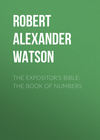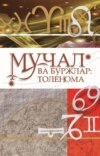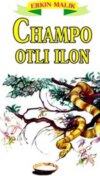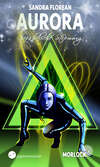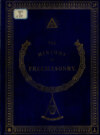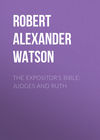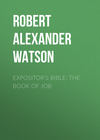Kitabı oku: «The Expositor's Bible: The Book of Numbers», sayfa 11
XII THE DOOM OF THE UNBELIEVING
Numbers xiv
The spirit of revolt which came to a head in the proposal to put Joshua and Caleb to death was quelled by the fiery splendour that flashed out at the tent of meeting; but disaffection continued, and Moses realised with horror that immediate destruction threatened the tribes. Jehovah would smite them with pestilence, disinherit them, and raise up a new nation greater and mightier than they. Moses himself should be the father of the destined race.
The thought was one at which an ambitious man would have grasped; and to entertain it might well seem a good man's duty. In what better way could one of earnest and courageous spirit serve the world and the Divine purpose of grace? Moses stood as a representative of Abraham, to whom the promise had been first given, and of Jacob, to whom it had been renewed. If the will of Heaven was that a fresh beginning in the old succession should be made, the honour was not lightly to be put aside. Moses now saw, as Abraham saw, a great possibility. The Divine purpose did not fail, though Israel proved unfit to serve it; in the field of a more instructed age that magnificent hope which made Abraham great would blossom more generously and yield its fruit of blessing. With the sense of this possible honour to himself, there came, however, to Moses other and arresting thoughts. For Abraham had become great by sacrifice, and only one spiritually greater even than he could found a worthier race. Did Moses not think of that scene on Moriah, when the son of the promise lay stretched on the altar, and feel himself inspired for a sacrifice of his own? Yet what could it be? Nothing but the silent inward refusal of that great honour which was being put in his power, the honour of becoming even higher than Abraham in the line of originators. True, it seemed that necessity was laid on him. Yet might not Jehovah intervene on Israel's behalf as once before on Isaac's, when the moment of his death had almost come? Not to sacrifice Israel was the call Moses heard when he listened in the silence, but to sacrifice his own hope, though it seemed to be pressed on him by Providence. And this began to prove itself the necessity. On the one hand he could not hide the fear that even if the Israelites were settled in Canaan a long period of education would be required to fit them for national life and power; after many generations they would be still incapable of any high spiritual task. But if Israel perished, what would happen? The faith of Jehovah, already established as an influence in the world, would fall into abeyance. When doom fell on Israel, the Egyptians would hear of it, Canaan would hear of it. The desert, the valley of the Nile, the hills of the Promised Land, would ring with the exultant cry that Jehovah had failed. And then—how long would the world have to wait till this seeming defeat could be retrieved? Century after century had passed since Abraham left his own land to fulfil the vocation of God. Century after century would have to pass before the sons of Moses could attain to any greatness, any power to move the world. The instrument Jehovah had meanwhile to use was imperfect; the tribes were not like a strong two-edged sword in the hand of the King. Yet they existed; they could be used, and Divine might, Divine grace, could overcome their imperfection. Ere the world grew older in ignorance and idolatry, Moses would have the heavenly purpose wrought. For this he will renounce, for this he must renounce, the honour possible to himself. Let Jehovah do all.
His choice made, Moses intercedes with God. The prayer has an air of simple anthropomorphism. He appears to plead that Jehovah should not imperil His own fame. The underlying thought is partly concealed by the form of expression; but the meaning is clear. It is the dawning power of the religion of God for which Moses is concerned. He would not have that lost to men which by the events of the exodus and the wilderness journey has been so far secured. Egypt is half persuaded; Canaan is beginning to see that Jehovah is greater than Anubis and Thoth, than Moloch and Baal. Was that impression to fade and to be succeeded by doubt, possibly contempt of Jehovah as Israel's God. He had brought His people into the wilderness, but He could not establish them in Canaan; therefore He slew them: if that were said, would not the loss to mankind be incalculable? "Thou, Jehovah, art seen face to face, and Thy cloud standeth over them, and Thou goest before them in a pillar of cloud by day, and in a pillar of fire by night." The astonished lands have seen this; let them not return with greater trust than ever to their own poor idols.
In the report of Moses' intercession words are quoted which were part of the revelation of the Divine character at Sinai: "Jehovah slow to anger, and plenteous in mercy, forgiving iniquity and transgression, and that will by no means clear the guilty; visiting the iniquity of the fathers upon the children, upon the third and fourth generation." The prayer quoting these latter clauses is abundantly sincere; and it proceeds on the belief that mercy rather than judgment is the delight of God. The greatness of the Divine compassion already shown time after time since the people left Egypt is still relied upon. And the desire of Moses is granted so far as it is in harmony with the character and purpose of God. "Thou wast a God that forgavest them, though Thou tookest vengeance of their doings" (Psalm xcix. 8).
Jehovah says, "I have pardoned according to My word." The national sin is not to be visited with destruction of the nation. No pestilence shall exterminate the murmurers, nor shall they be left without the guidance of Moses and of the cloud to melt away in the plagues of the wilderness. But yet the power of Jehovah shall be shown in their punishment; the manner of it shall be such that the earth shall be filled with the glory of the Lord. The men who came out of Egypt and have tempted Jehovah ten times shall never see Canaan. Their carcases shall fall in the desert. For forty years shall the Israelites wander as shepherds till the evil generation shall have disappeared.
Divine Providence judges the pusillanimity of men. Their fear deprives them of that which is offered and actually put within their grasp. They prove themselves incapable when the time of decisive endeavour comes, and a new generation must arise before the ripeness of circumstance again opens the way. The case of the Israelites shows that rebuke and disappointment are necessary in the Divine discipline of human life. Defects of character, of faith, are not overborne by a tour de force in order that the development of a heavenly purpose may be hastened. It would indeed cease to be a heavenly purpose, if with easy forgiveness God gave miraculous success. The result would be no gain in the long-run to any good cause. If men fail, God can wait for others who shall not fail. We are apt to forget this; we think that we show proper trust in the fulness of Divine pardon when we insist that men who have erred and been forgiven, who have faithlessly missed their opportunity and passed through penitence into new zeal, shall be hurried on to the duties they refused to face. But now, as in the times of Israel, the law of adequate discipline forbids, the law of punishment forbids. Humanity is not to be cheated of its Divine instruction, nor shall any pretext of generosity or necessity be urged in order that certain men may enter a Canaan they once refused to possess. We see a term set to a probation.
Does it appear an inordinate punishment, this denial of Canaan to the unbelieving? There is no need to think so. For the men and women who held back in doubt of God, the wilderness, quite as well as Canaan, would serve the main end, to teach them trust. Life went on still under the protection of the Almighty. The desert was His, as well as the land flowing with milk and honey. Yea, in the desert they had, being such as they were, fewer temptations to question the power of God and their own need of Him than they would have found in the land of promise. May we not say that men who had been so ready to receive an evil report of the land would have been confirmed in their doubt of Jehovah if they had been allowed to cross the frontier? Better for them to remain in the desert that made no pretence to be anything else, than to enter Canaan and find excuses for calling it a desert. No individual was prevented from learning to know God and trust Him; of that we may be sure. The way of instruction was that of penitence and sorrow and continued hardships. But there would have been no other way for those unbelievers even if they had entered on the promised inheritance. In Canaan, as well as in the desert, they would have had to learn contrition, to advance in moral life by means of temporal hardships and defeat.
And there was a limitation of the judgment. Only those from twenty years old and upward were included. The young men and young women, presumably because they had not bewailed their lot and cried against Moses and God, having too much of the hopeful spirit of youth, were not condemned to die in the wilderness. A difference was there, and by the terms of the deliverance was made clear, which often comes to light in human history. The old, who should know most of the goodness of God and His unfailing power, draw back; the young and inexperienced are ready to advance. Men who are occupied with affairs tend to think that their wise management brings success, and they place Divine Providence secondary to their own wisdom. Shall we be able for this? they ask. Does this approve itself to us as men of the world, responsible men? If not, they think it would be folly to go forward even at the call of God. But the young are not so wise in their own experience; they are in the mood to dare: the young and the trustful—men like Joshua and Caleb, who have learned that power and success are of God, and that His way is always safe. To calculate and act on the basis of expediency is not the failing of the young. Let us pray for men who have faith in the future of humanity and of the Church to stand forth and rally about them the youths, not spoiled by overwise theories of life, who have still in their souls the heavenly instinct of hope.
Caleb has here and elsewhere in the history peculiar honour, all the more remarkable that he was, properly speaking, no Israelite. The narrative at this point associates his family with the tribe of Judah. But Caleb was a Kenizzite (Numb. xxxii. 12); and Kenaz appears in Gen. xxxvi. 11, 15, as an Edomite or descendant of Esau. At what time this particular Kenizzite family joined the expedition of Israel we have no hint. As yet, however, there was no inter-marriage; and it should be noticed that the district which in consideration of his fidelity Caleb has for his inheritance in Canaan is the same as was occupied by Kenizzites before the conquest. There is, of course, no improbability in this; it may rather appear to give proof of the genuineness of the narrative. Caleb joins the Israelites, attaches himself to Judah in the camp and on the march, proves himself a faithful servant of God and of the host, and has the promise of his forefathers' inheritance when the distribution of Canaan shall be made. He reported favourably of the region about Hebron; and Hebron became his city, as we learn from Josh. xiv.
In contrast to the special promise made to Joshua and Caleb is the fate of the other ten whose report brought "a slander upon the land." These "died by the plague before Jehovah." It would seem that before Moses appealed to God on behalf of the people, the pestilence was spreading which might have swept the Israelites down like Sennacherib's army in after-times. And the ten false spies had been among the first to die. Little indeed know men how soon Providence will convict them of their faithlessness and rebellion. Let us save our lives, they say, by holding back from duties that involve difficulty and danger. Why advance where we are sure to fall by the sword? But the sword finds them nevertheless, or the plague lays hold of them; and where then is the life they were so careful to preserve? The men of Israel who said, "Let us not go to Canaan, but return to Egypt," neither see Canaan nor Egypt. They gain nothing they desire; they lose all they were so careful to keep.
Suddenly at ver. 40 we are brought to a new development. The people no sooner hear their doom than they resolve to take the future into their own hands. They acknowledge that they have sinned, meaning, however, only that they have fallen into a mistake the consequence of which they had not foreseen; and with this inadequate confession of fault they decide to make the advance into Canaan forthwith. They do not see that instead of recovering their hope in God by any such attempt they will really deepen the alienation between themselves and Him. Submission is indeed hard, but it is their one grace, their one duty. If they press on into Canaan, they must go without the Lord, as Moses warns them, and they shall not prosper.
It is not enough when men have discovered an evil heart of unbelief, and turned again in repentance, that they take up the thread of life which has become ravelled. Perverse faithlessness cannot be cured by a sudden decision to resume the duty which was abandoned in fear. The refusal was no superficial thing, but had its source in the springs of will, the character and habits of life. We are apt to judge otherwise, and to suppose that we can alter the whole current of our nature by a single act of choice. To-day the trend is strongly in one direction, along a channel which has been forming for many years; to-morrow we think it possible to become other men, strong where we were weak, determined upon that which we abhorred. But something must intervene; some change must take place deeper than our impulse. We must have the new heart and the right spirit; and in proportion to the gravity of the situation and the importance of the duty to be done must the time of discipline be long. The wilderness wandering had to be for many years because the temper of a whole people was to be altered. For a single person a far shorter ordeal may suffice. He may pass through the stages of conviction, repentance, and new creation in a few weeks or even days. Nay, sometimes the regenerating Spirit brings about the change apparently in a moment. Yet the rule is that stability in faith must come slowly, that the way of trial cannot be hastened. A great task, therefore, the right doing of which is necessary to the open vindication of religion, may not be gone about in a sudden change of mind. We are not to take lightly, into untried hands, the massive plough of the kingdom of God.
In Canaan, the Amalekites and Canaanites, Moses said, would dispute the advance of Israel,—Amalekites skilled in desultory war, Canaanites long trained in military art. These would fight without any sense of the support of the true God. But how would the Hebrews speed, meeting them on the same footing? The contest would be then between human skill and daring on either side; and there could be no doubt as to the issue. Bands of men acquainted with the country, disciplined in war as the tribes of Israel were not, fighting for their fields and homes with a defence of walled cities to fall back upon, would certainly win. If the Hebrews went up, it would be without the sign of Jehovah's presence; the ark of the covenant could not be borne with the army on such an expedition. Their attempt, being presumptuous, must end in disaster.
Too often the conflicts in which the Church is involved are of this very kind. There is profession of high moral design and Christian principle. Ostensibly it is for the sake of true religion that something is undertaken. But in reality the affair is not one that belongs to the essence of faith. It is perhaps a question of prestige, of exclusive claim to certain rights or moneys, the very last thing a Christian church should insist upon. Then the contest is between human diplomacy and resolution, whether on the one side or the other. It is idle to call a campaign like this a holy war. The ark of the covenant does not accompany the army that calls itself Jehovah's. As Israel found that even Amalekites and Canaanites were too strong for her, so has the Church often found that men whom she termed unbelievers were superior to her in the arms she chose to use. Again and again have her forces had to retire smitten even unto Hormah. For those who are called unbelievers and atheists have their rights; and they will always be able to maintain their rights against a presumptuous church which "goes up into the mountain" without the sanction of its living Head.
It was no general advance of the tribes that on this occasion ended in defeat. The solid, resolute march of the whole people was a very different thing from the half-hearted sally of some hundreds of fighting men. When the host of the Israelites, men, women, and children, moved together, the men of war had support in the sympathy of those they defended, in the prayers of the priest and of the people. They were nerved to play the part of heroes by the thought that all depended upon them, that if they failed their wives and children would be put to the sword. And again there is a parallel in the advance of the Church against her adversaries. If the officials only go out to fight, if it is their affair, their expedition, if there is no strong onward movement of the whole host, what is there to give support to the enterprise? The fighting men may seem to have heart enough for their battle; but the underlying feeling that they are not engaged in the defence of the Gospel itself, or in guarding any position on which the power and success of the Gospel depend, must always, and properly, weaken their arms. There is all the difference in the world between an ecclesiastical battle and the contest for vital faith. And it is a matter of regret that so much of the strength and ardour of good men should be wasted in downright earthly fighting, when the feeling of the Church as a whole is not with those who claim to be her army. Let all the tribes, that is to say all the churches of Christ that are of one mind as to vital truth, advance together, without jealousy, without mutual contempt, and the opposition to Christianity will practically melt away.
From the twenty-first chapter, which appears to open with a reminiscence of the first attack on Canaan, we gather that one of those who opposed the expedition was the Canaanite King of Arad. The advance appears therefore to have been made by way of Hezron and Beersheba. The mountains visible from the camp were likely the chalk hills beyond the "Ascent of Akrabbim." These passed, probably near Hezron, a valley opened, stretching away towards Hebron. The Amalekites gathering from every wady, and the Canaanites from the ridge to the right, where Arad lay, seem to have fallen upon the Hebrews with a sudden onset. While many escaped others were slain or taken captive. A keen memory of the defeat survived; but it was not till long afterwards, in the days of the judges, that the strongholds of the region were reduced.
XIII
OFFERINGS: SABBATH-KEEPING: DRESS
Numbers xv
The enactments of this chapter regarding meal offerings and drink offerings, the heave offerings of the first dough, and the atonement for unwitting errors belong to the cultus of Canaan. Nothing generic distinguishes the first and third of these statutes from some that were presumably to be observed in the desert; but the note is explicit, "When ye be come into the land of your habitations which I give unto you," "When ye be come into the land whither I bring you." The whole chapter, with its instance of presumptuous sin introduced by the clause, "And while the children of Israel were in the wilderness," marking a return to that time, and its commandment regarding the fringes or tassels of blue to be attached to the dress as remembrancers of obligations, may appear at first sight without any reference either to what has preceded or what follows. The compilers, however, have a definite purpose in view. The presumption of Korah and his company, and of Dathan and Abiram, is in contrast to the unwitting faults for which atonement is provided, and it comes under the category of what is "done with a high hand"—a form of blasphemy which is to be punished with death. The case of the Sabbath-breaker is an instance of this unpardonable sin, and sends its light on to the incidents that follow. Even the memorial fringes or tassels, and the prophetic sentences that accompany the command to wear them, seem to be forewarnings of the doom of sacrilegious men.
1. Meal and Drink Offerings.—The statute regarding offerings "to make a sweet savour unto Jehovah" is specially occupied with prescribing the proportion of flour and oil and wine to be presented along with the animal brought for a burnt offering or sacrifice. Any one separating himself in terms of a vow, or desiring to express gratitude for some Divine favour, or again on the occasion of a sacred festival when he had special cause of rejoicing before God, might bring a lamb, a ram, or an ox as his oblation; and the meal and drink offerings were to vary with the value of the animal brought for sacrifice. The law does not demand the same offering of every person under similar circumstances. According to his means or his gratitude he may give. But deciding first as to his burnt or slain offering, he must add to it, for a lamb, the tenth of an ephah of fine flour mixed with a quarter of a hin of oil, and also a quarter of a hin of wine. For a bullock, the quantities were to be three-tenths of an ephah of fine flour, with half a hin of oil, and, as a drink offering, half a hin of wine.
The provision is a singular one, based on some sense of what was becoming which we cannot pretend to revive. But it points to a rule which the Apostle Paul may have recognised in this and other Jewish statutes as belonging to universal morality: "Take thought for things honourable in the sight of all men." To make a show of generosity by giving a bullock, while the flour and oil and wine were withheld, was not seemly. Neither is it seemly for a Christian to be lavish in his gifts to the Church, but withhold the meal offering and drink offering he owes to the poor. Throughout the whole range of use and expenditure, personal and of the family, a proportion is to be found which it is one of the Christian arts to determine, one of the Christian duties to observe. And nothing is right unless all is right. The penny saved here takes away the sweet savour of the pound given there. No man is in this to be a law to himself. Public justice and Divine are to be satisfied.
The presence or absence of oil in an oblation marked its character. The sin offering and the jealousy offering were without oil. The "oil of joy" (Isa. lxi. 3) accompanied festal and peace offerings. All ordinances prescribing the oblation of wine and oil necessarily belonged to the cultus of Canaan, for in the wilderness neither of these elements of the sacrifice could be always had. The idea underlying the peace offerings, with their accompanying meal and drink offerings, was unquestionably that of feasting with Jehovah, enjoying His bounty at His table. Acknowledgment was made that the cattle on the hills were His, that it was He who gave the harvest, the vintage, and the fruit of the olive-grove. Confession of man's indebtedness to Jehovah as Lord of nature was interwoven with the whole sacrificial system.
In connection with this ordinance of meal and drink offerings, and that of atonement for unintentional failures in duty (ver. 22 ff.), it is very carefully enacted that the law shall be the same for the "homeborn" and the "stranger." "For the assembly there shall be one statute for you and for the stranger that sojourneth with you, a statute for ever throughout your generations: as ye are, so shall the stranger be before the Lord." The design is to secure religious unity, and by means of it gradually to incorporate with Israel all dwellers in the land. While certain ordinances were intended to make Israel a holy nation separated and consecrated to Jehovah, this admission of strangers to the privileges of the covenant has another design. In the Book of Deuteronomy (vii. 2) a statute occurs that entirely excludes from citizenship and incorporation all Canaanites, Hittites, Jebusites, Amorites, Hivites, Girgashites, and Perizzites. There was to be no intermarriage with them, no toleration of them, lest they led Israel away into idolatry. The statute is enforced by the words, "For thou art an holy people unto the Lord thy God: the Lord thy God hath chosen thee to be a peculiar people unto Himself, above all peoples that are upon the face of the earth." With this emphatic assertion of the severance of the Hebrews from other races the strain of Numbers, as well as Exodus and Leviticus, generally agrees. When we endeavour to harmonise with it the admission of strangers to the right and joy of sacrificial festivals, we at once meet the difficulty that no other races were fitter to be received into religious confraternity than those of Canaan. Neither Babylonians, Syrians, Phœnicians, nor Philistines were free from the taint of idolatry; and however degrading the rites of the Canaanites were, some of the other nations followed practices quite as revolting.
We know that for a long period of Israel's history strangers were, according to the statute presently under consideration, admitted to the fellowship of religion, as well as to high office in the state. "We have only to study the Book of Joshua to discover that the Israelites, like the Saxons in Britain, destroyed the cities and not the population of the country, and that the number of cities actually overthrown was not very large. We have only to turn to the list of the 'mighty men' of David to learn how many of them were foreigners, Hittites, Ammonites, Zobahites, and even Philistines of Gath (2 Sam. xv. 18, 19; vi. 10). Nor must it be forgotten that David himself was partly a Moabite by descent."6 In accordance with this large tolerance we might be disposed to include among the "strangers" admitted to privilege men belonging to races that inhabited Canaan before the conquest. Even Deuteronomy seems in one passage to exclude none but Ammonites and Moabites; and the covenant law of Exod. xxiii. commands generous treatment of the stranger. In contrast to the "homeborn," strangers may appear to mean those only who had come from other countries and chosen to identify themselves with the faith and fortunes of Israel; still this passage attempts no such definition, and on the whole we must allow that the Mosaic law in regulating the political and social position of resident non-Israelites showed "a spirit of great liberality." They had, of course, to conform to many laws—those, for instance, of marriage, and those which forbade the eating of blood and the flesh of animals not properly slaughtered. If uncircumcised, they could not keep the Passover; but being circumcised, they had equal rights with the Hebrews. The purpose evidently was to make an open way to the benefits of Israel's government and religion.
The heave offering of the first dough is placed (ver. 20) side by side with the heave offering of the threshing-floor of the first sheaves. In Leviticus (xxiii. 17) a harvest oblation is ordered—two wave-loaves of fine flour baken with leaven. Here the heave offering of a cake made from the first dough is not accompanied with sacrifices of animals, but is of a simple kind, mainly a tribute to the priests. The Deuteronomic statute regarding firstfruits, which were to be put in a basket and set down before the altar, prescribed a formula of dedication beginning, "An Aramean ready to perish was my father, and he went down into Egypt": and the offering of these firstfruits was to be an occasion of joy—"Thou shalt rejoice in all the good which the Lord thy God hath given unto thee and unto thine house, thou and the Levite, and the stranger that is in the midst of thee." There can be no question that the most developed statute regarding these harvest offerings is that given in Leviticus, where the exact time for the presentation of the loaves is fixed, the fiftieth day after the Sabbath, from the day when the sheaf was brought. The feast accompanying the offering of the loaves came to be known as that of Pentecost.
Passing now to the law of atonement for unintentional omissions of duty, we notice that the introductory sentences (vv. 22, 23) have a peculiar retrospective cast. They seem to point back to the time when the Lord gave commandment by the hand of Moses. It would appear that in course of years discovery was made that portions of the law were neglected, and the provisions of this statute were to relieve the nation and individuals of accumulating defilement. "When ye shall err, and not observe all these commandments, which the Lord hath spoken unto Moses, even all that the Lord hath commanded you by the hand of Moses, from the day that the Lord gave commandment, and onward throughout your generations; then it shall be, if it be done unwittingly, without the knowledge of the congregation"—so runs the preamble. A series of statutes in Lev. iv. contemplates offences of a like kind, when something has been done which the Lord commanded not to be done. The enactment of Numbers appears to point to a "complete falling away of the congregation from the whole of the law," an unconscious apostasy. Maimonides understands the provision as relating to guilt incurred by the people in adopting customs and usages of the heathen that seemed to be reconcilable with the law of Jehovah, though they really led to contempt and neglect of His commandments.7
